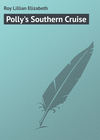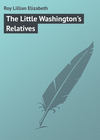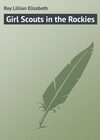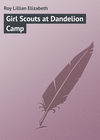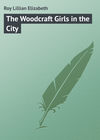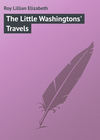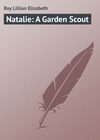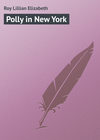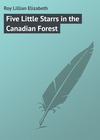Buch lesen: «Polly's Southern Cruise»
CHAPTER I – THE PERFECTED PLANS
“Well, now, that’s settled!” declared Polly Brewster, as she leaned back in a comfortable arm-chair and scanned her friend who sat hunched over the papers scattered upon the table.
“Settled – but only between us. It remains to be seen how our suggestions will be received by Dalky and Mrs. Courtney,” returned Eleanor Maynard, the young lady just addressed.
“To tell the truth, Nolla,” began Polly in a lowered tone, “I’d much rather sail the seas with Dalky, in his yacht, than venture in a rented craft supervised by Mrs. Courtney – even though she is the dearest thing I ever had for a chaperone!”
Nolla was the nickname given Eleanor, and Dalky was the pet name bestowed upon Mr. Dalken by these two girls – his staunch admirers. As yet they had not discovered an appropriate title to use for their first customer and intimate friend Mrs. Courtney.
“Well, Nolla, seeing we’ve used up carloads of good paper in outlining this itinerary, and worn out the patience of all the clerks in the various Tour Offices, let us act upon our last decision: Propose the plans for our ocean picnic at the general meeting of our friends to-night.”
“It is such a radical change from the trip suggested by Mrs. Courtney, and the outlined voyage desired by Dalky, that I fear we’ll be vetoed in the final ballot,” ventured Eleanor.
“They can only say no to us!” exclaimed Polly, getting up from her chair and gathering in all the now useless sheets of paper which showed where arduous ideas had been expressed upon their white surfaces. But one sheet was left safely at the end of the table. This single sheet was picked up by Eleanor and carefully placed within her script case. The discarded sheets were torn up and thrown into the waste basket.
“We may as well go home and try out the plans on the Fabians,” said Polly, after rearranging the desk-table.
“And see that we look our best for the conquest to-night,” laughed Eleanor, looking about for her hat and coat.
Are you acquainted with Polly and Eleanor? If not, you should be. They are the two friends who were introduced to us several years ago at Pebbly Pit Ranch. Remember? At our first meeting with them these two girls were barely past fourteen; but we founded a firm friendship with them and their immediate companions, at the great Colorado ranch, and this friendship has lasted all through the interesting, and many times thrilling, adventures these girls experienced. To you, who have been denied this friendship, we will introduce our girls.
Polly Brewster, born and reared on her home ranch in the Rockies of Colorado, first met and established a friendship with Eleanor Maynard of Chicago, when Eleanor, attended by her elder sister Barbara and Anne Stewart, spent the summer with the Brewsters at Pebbly Pit Ranch. During that visit the girls, while on a mountain ride, discovered the vein of gold which later developed such amazing phases of interest and trouble for all concerned in its products.
The summer ending, the two young girls, now firm friends, won the consent of their parents to allow them to accompany Anne Stewart to New York City, where Anne was engaged to teach a very high-grade, young ladies’ school. Polly and Eleanor planned to enter this school, and take up interior decorating as an extra study.
Having been admitted to a course at Cooper Union Night Classes, the two girl friends found Mr. Fabian, the lecturer, a most valuable friend. Through Mr. Fabian the girls were enabled to attend many private exhibitions of art goods and antiques, also to go to lectures, visit gatherings where interior decorating was the subject of discussion, and in other ways reap the benefit of the many years’ experience of this gentleman.
During their school years in New York Polly and Eleanor became acquainted with a staunch friend, a Mr. Dalken; and met and became intimate friends with the Ashbys – the Ashby of the famous Ashby Shops on Fifth Avenue, where one may find any rare or antique object known to home-makers or decorators.
Through the acquaintances thus formed the two girls were invited to join the touring party about to start for Europe the year that Polly and Eleanor finished their schooling. After a summer abroad visiting interesting places and seeing all that was worth viewing, the group of Americans returned home.
That fall the two girls decided to enter business in an humble way. They secured desk-room in Mr. Ashby’s business house and ventured forth to find and purchase antiques, in order to sell them again at a reasonable profit. The amusing incidents experienced while in search of odd and old objects constitute several chapters of the book called “Polly’s Business Venture.” At the ending of that book the reader is introduced to Mrs. Courtney, who interested herself in the two young business girls and eventually invited them to accompany her on a cruise to the Southern Seas. Before any plan could be perfected, however, Mr. Dalken hinted at his plan to go on an extended yachting cruise to the Orient. Naturally, he wished a party of his old friends to accompany him; and Polly and Eleanor considered themselves part of that group.
Thus it happened that about the time the present story opens Polly and Eleanor had been planning various itineraries to place before their friends – Mr. Dalken and Mrs. Courtney. It mattered not so much to the girls whether they sailed to the Orient as the guests of Mr. Dalken, or went on a long cruise to the South Sea Islands with Mrs. Courtney, as long as they went somewhere! From this state of mind the reader can gather that the Wanderlust had implanted its germ in the consciousness of each of these girls.
Having gathered their papers together the girls left the pretty private office where they were supposed to attend to their business affairs, and started homeward to the Fabian’s domicile where they lived. It was too late, upon their arrival at the house, to discuss the tour with either Mr. or Mrs. Fabian, hence they went directly to their rooms and dressed as becomingly as possible, knowing, as they well did, that appearances play an important part in any business, be it pleasure, financial, political or just simple family matters.
Just as Polly had added a huge velvet rose to the girdle of the Parisian dress she had chosen to wear, Nancy Fabian called from the hallway:
“Girls! Are you almost ready? Daddy has been cooling his impatience in the library for the last ten minutes; and mother and I are ready to go down.”
“Coming, Nan!” called Polly in answer. “Find out if Nolla is ready, please.”
“I’m here – no need to call me,” laughed Eleanor, coming from her room as she spoke.
“Dear me!” exclaimed Nancy Fabian. “Why all the fine feathers on our bird, Nolla?”
Mrs. Fabian and Nancy looked at Eleanor’s handsome dinner dress with admiration, and Eleanor laughed as she replied to Nancy’s query:
“As long as this bird has no wish to be plucked at the argument that is certain to be started on the subject of the sea-trip, she donned her finest feathers to help her win out with Dalky.”
At this moment Polly appeared at her room door. She, too, caused Nancy to catch her breath. “Goodness me! I didn’t stop to floss up as if we were going to a Court Reception! Why didn’t you girls tell me you were going to put on your best?”
“Nancy, dear, don’t worry,” was Polly’s consoling reply. “You haven’t the diplomatic work cut out for yourself that Nolla and I have. We have to win Dalky over to a very important agreement to-night, hence these fine togs!”
Mrs. Fabian had been descending the stairs, but she heard what had just been said and she laughed lightly. Soon all four had reached the front hall where Mr. Fabian paced the floor.
“My dear girls! You know how I dislike being late to a host’s dinner party! Here it is ten minutes past the time we were to present ourselves at Dalky’s apartment.” As he spoke Mr. Fabian took his watch from his pocket and displayed its face to the tardy young ladies. But they never stopped to glance at it.
“Daddy, dear, stop scolding, and hurry out to the car,” said Nancy, giving her father a loving push towards the front door.
“There’s one consolation in knowing we won’t be the last guests at Dalky’s dinner to-night,” remarked Eleanor, as they settled themselves in the limousine which Mr. Dalken had sent for their use that evening.
“Why – what do you mean?” asked Mrs. Fabian, wonderingly.
“Mrs. Courtney! She’ll be ten minutes later than this unit,” replied Eleanor.
“How do you know that?” asked Nancy.
“Just before we left the office she called us on the telephone to ask if we had decided upon a plan for our cruise, and we replied that we had it all outlined. Then she told us she might be detained downtown where she was then, and that we were to tell Mr. Dalken not to wait dinner for her. She would come in as soon as she could, but even at that she might be half an hour after the time he mentioned in his note to her.”
As Mr. Dalken’s bachelor apartment was but a short drive from the Fabian’s residence, the chauffeur soon stopped before the door and the girls prepared to get out. A few minutes later they were being welcomed by their smiling host. Then he scolded.
“Late as usual! Not that I would include Mr. Fabian in that rebuke, because a man is never late – especially when it is a dinner. But the ladies! Ah me! So many valuable hours wasted before a mirror, and who for – tell me that! For a number of old fogies like Ashby, Fabian and myself.”
But the ladies laughed his scolding to silence. They knew their host! He was the pink of neatness himself, and he always noticed the gowns and general appearances of his lady guests.
“Who’s coming to-night, Dalky?” asked Polly, not waiting to answer his rebuke about being late.
“Oh, the Ashbys are already here; then there will be Mrs. Courtney, who will be late, of course, and my daughter Elizabeth. She ought to have been here before this.”
As he spoke he threw open the door of the guestroom and ushered his friends in; but taking Mr. Fabian by the arm to show him into his own suite of rooms.
As soon as the door of the guestroom was closed Polly glanced at her three companions who were silently exchanging looks with each other. Then Eleanor whispered her opinion:
“Elizabeth! Of all the world she is the last I should have expected here to-night. I just know her mother sent her to pry into Dalky’s plans for this cruise. Naturally, such a woman would have heard about her ex-husband’s plans for the next few months.”
Polly frowned at this declaration, but Mrs. Fabian, always anxious to give a person the benefit of a doubt, remarked kindly: “We must remember that Elizabeth is her father’s only child. Perhaps she is dining here this evening by accident – not by planning.”
But Eleanor flared up in defence of her friend Dalky. “If you knew that girl as well as Polly and I understand her from school days, you’d not take this generous view of her and her mother’s schemes. I only hope Dalky hasn’t any idea of inviting her to go with us on his yachting cruise. She’d just spoil all the fun for me!”
“With Elizabeth present at the table I’d feel embarrassed in speaking of our plan, Nolla; or of saying a word about any cruise,” added Polly, seriously.
“Yes, that’s just it: Elizabeth is a kill-joy for every one wherever she goes,” was Eleanor’s angry retort.
“Well, girls, let us not excite ourselves before we know why Elizabeth is present to-night. Plenty of time to talk over her lack of amiability when we discover she will be a member of Dalky’s party,” advised Mrs. Fabian, moving towards the door of the dressing room.
As she opened it the four friends who were ready to leave fell back because the object of their criticism stood upon the threshold.
“Oh, dear!” cried the girl with a pretty pretence of feeling surprise, as she quickly placed her hands over her heart. “I was told to leave my wraps in Daddy’s guestroom, but I was not aware that it was occupied. I’m sorry if I startled you as I have been.”
Elizabeth Dalken was the fashionable product of New York’s ultra society – at least she and her mother liked to believe they were embraced upon that clannish upper-plane. But it is doubtful if one of the Four Hundred even dreamed of there being such aspirants to recognition.
The girl was very pretty, in an appealing ingenue way, her type being of the clinging order. Her features were regular enough, but lacked all signs of confidence or character. Her hair was beautiful, being of the wavy, fluffy, gold shade of blonde. Were it not for her stylish apparel, and the lines produced by the highest-priced tailor and mantua-maker in the country, Elizabeth’s figure might have been termed awkward, and her natural carriage ungainly. But style hides a multitude of short-comings!
The Fabians, as well as Polly and Eleanor, were acquainted with Elizabeth Dalken, so, after a few words of greeting, they left the room to the new guest. Needless to add that Elizabeth found it necessary to remain in the room for four times the length of time the other four guests had occupied it. But they had not felt the need of touching up their lips, or relining their brows with a pencil, nor, indeed, to add a rosy hue to their healthy complexions. Elizabeth was about to send a last glance at the long mirror to see that her gown was faultless, when the bell summoned Mr. Dalken to his entrance door. This time the new comer called forth a chorus of merry welcomes from the group of guests in the living room, the archway of which offered a good view of the front door and the reception hall.
“Welcome, Mrs. Courtney! Glad you found it possible to get here before dinner is announced,” said Mr. Dalken, smiling upon his guest.
“Oh! I am glad, too! I thought you would be through the first course, as it is really half an hour past the time you said,” remarked Mrs. Courtney, releasing her small gloved hand from the unconscious hold of her host’s warm clasp. He had been appraising her beauty and appearance and forgot he held her hand.
“Come to the guestroom, Mrs. Courtney. My little girl Elizabeth is still there, and she will be delighted to meet you and render any little service you may need. You see, a confirmed bachelor as I am, fails to provide a maid or other necessities for ladies when they deign to dine at his rooms.” As he spoke, Mr. Dalken ushered Mrs. Courtney to the guestroom door. Then he paused and knocked upon the panel.
Elizabeth threw the door open, appearing as a radiant vision to her father, who said: “Ah, Tots! Here is a friend of mine. In the absence of a maid, I know you will be happy to assist in any way. Mrs. Courtney, my daughter Elizabeth; Totty, Mrs. Courtney.”
Without waiting to see if this meeting proved to be harmonious, Mr. Dalken closed the door upon Mrs. Courtney, and hurried to his valet-cook to say that the last guest expected had just arrived. Karl nodded his head silently, and proceeded to instruct the Japanese servant to turn up the lights in the diningroom.
At the closing of the guestroom door Elizabeth turned and purred sweetly upon the lady to whom she had just been introduced. She seemed over-eager to assist in removing the handsome evening wrap, and she stood hovering near while Mrs. Courtney stood before the dressing mirror to arrange her crushed hair. The girl babbled of many things, but with all her babbling she never lost sight of one detail of the lady’s costume and make-up, and of the possible valuation of the magnificent diamonds and pearls which adorned her person. The jewelry caused pangs of envy in Elizabeth’s soul, for she was mad over jewels.
Out in the living-room, the waiting guests amused themselves.
“Before we prepare any further arguments to win our case before the tribunal of the higher authorities, we’d better sit back and watch whether this will be a proper evening to throw the bomb,” remarked Polly, dryly, to her chum Eleanor.
“But this is the reason we are all assembled at dinner to-night!” exclaimed Eleanor, impatiently. “Dalky wants to get away from New York without further delay, you know.”
“Well, I don’t know! Only do be circumspect, Nolla, in the presence of Elizabeth. We know her, and we do not know what she might say or do to make trouble for our dear Dalky, if she once finds that he plans to take us all on a long cruise.”
“She can’t say or make any trouble for him, that I can see!” retorted Eleanor. “That woman got her divorce, all right, and is married hard and fast to that awful suitor, so what other trouble can be started after that?”
Polly did not reply, but she shook her head sympathetically. The sympathy, Eleanor understood, was all for “Poor Dalky!”
Mrs. Courtney and Elizabeth now came from the guest-room, Elizabeth smiling sweetly, and Mrs. Courtney with her well-set head held a trifle higher than was her wont, and with two bright spots of crimson touching her cheeks with the hue of restrained blood which must be dancing in her veins. Her eyes, when she looked at Polly, were shooting sparks, but these soon disappeared after she shook hands with her friends who were glad to see her.
“See that!” whispered Eleanor quickly to Polly. “That sweet little wasp has stung Mrs. Courtney with something she has said, or hinted at!”
“So it seems. I wish I knew what to do,” mused Polly.
“Just wait and keep your eyes and ears wide open. We’ll catch Elizabeth in any little plot she or her mother may have planned,” declared Eleanor.
At this moment the Japanese attendant came to the door and announced dinner. The friendly party, being so informal, grouped itself about Mr. Dalken and all moved slowly towards the dining-room – all but Elizabeth Dalken. While all her companions walked from the living-room to the diningroom, listening to her father’s account of a wonderful catch of fish in the Maine streams, she had managed to get away unseen and enter the guestroom. Behind the closed door of the room she found what she had planned to secure. Information.
Mr. Dalken designated their seats to his friends, and turning to Mrs. Courtney said, politely: “As you are a guest in my home for the first time I have assigned the seat of honor to you – at my right. Of course, I had to beg permission of Polly and Nolla before daring to trespass upon their rights, – they generally fight for this place.”
Polly smiled and tossed her head, but Eleanor vehemently denied any such weakness, while the adults in the party laughed at their host’s teasing ways. Mr. Dalken, meantime, had been searching for his daughter Elizabeth. She was not to be seen.
“Why! This is strange; did not Elizabeth come to the diningroom just now?” asked he in amazement of his guests.
The guests looked from one to another in surprise. They all believed the girl to have been present with them. Before Mr. Dalken had time to send the servant to find the missing daughter, however, she ran from the dressingroom and hurried to the diningroom.
“Pardon my absence, Daddy,” was her call before he had time to ask what was wrong. “I just had to dab my nose a bit, you know.” She laughed lightly as though it would be understood how important a deed was the powdering of a nose.
Mr. Dalken patted the fluffy yellow head as Elizabeth slid into her chair. Then the servant was signalled to serve. Polly prodded Eleanor, who sat next her at the table, with her foot under cover of the long damask cloth. And Eleanor glanced at her friend to see what she meant to convey to her.
In a very low voice Polly said: “Don’t you say a word, hear me, Nolla? Wait till we know what Elizabeth wants to know.”
Eleanor winked knowingly. At the same time Mr. Dalken tossed the conversational ball into the arena for all to catch.
“Friends and fellow-countrymen,” began he, clearing his throat impressively, “we are assembled together this evening in order that the important event of taking a trip around the world may be duly discussed. After the arguments for and against the cruise in my yacht are heard, the chairman – that is myself – will allow two minutes to the argument for or against the acceptance of Mrs. Courtney’s offer to sail to the South Seas in her craft. The meeting is now open for all members of this party.”
Mr. Dalken then rubbed his hands vigorously as if to say he was washing them of all trouble henceforth. If the members in the party came to blows over their debate it would be nothing to him! His guests, understanding his action, laughed at him and bade him sit down.
“At least, Mr. Chairman, you might tell us the names of the speakers we are supposed to hear from this evening,” laughed Mr. Fabian.
“The first speaker to be heard from this evening, is our capable globe-trotter Mr. Fabian,” retorted Mr. Dalken without hesitation. A laugh greeted this introduction, but the servant was placing the first course before the hungry guests and it was silently agreed to give the first attention to the most important matter of food.
During the next three courses there were many suggestions, and merry arguments from the friends about that board, but Elizabeth Dalken, never missing a word or look of those who were concerned in the cruise planned, kept silence. She felt that she could work better and safer by getting the viewpoints of others and not showing her cards.
With the fourth course, however, Mr. Dalken seemed to feel certain of his own cruise being the accepted one. He turned to gloat politely over Mrs. Courtney’s defeat, when Mr. Ashby spoke.
“The only reason I feel inclined to vote for the Orient in Dalken’s yacht, is a selfish one: I would like immensely to be one of the party on this merry voyage, but I would not dare go on board a yacht that is destined for the South Seas. I would have no jumping-off place, in order to get me back to New York for the busy season. Now, should you all choose Dalky’s plan to go to Japan, I can remain with you until we reach Hawaii, there I can catch a fast steamship back to San Francisco, thence speed home to New York. Them’s my sentiments, fren’s!” concluded Mr. Ashby.
By the time the salad was served every one but Polly, Eleanor and Elizabeth had been drawn into the discussion. It took great self-control for the two girl-partners to keep silence in this vital and interesting debate.
Finally, Mr. Dalken turned to Eleanor and said: “In all my experience, this is the first time I have not heard Nolla have a say after every other orator. Either she has nothing to say, or she is waiting to drop a bomb upon our heads when we have said all we know.”
Eleanor laughed. “That’s just it! When you all are through I’ll say my little piece, and I’m sure it will take away your breath.”
The friends laughed, for they understood Eleanor and liked to urge her to discuss her egotistical opinions – often they were well worth hearing, too. Polly could not help sending Elizabeth a glance. The girl kept her eyes fixed upon her plate, defying Polly’s scrutiny.
Mr. Dalken held up a hand as he commanded: “Silence in this Court. Our wise Judge will now render an opinion!”
Eleanor instantly took up his line of chaff, and, midst the laughter, bowing politely, said in a dignified manner: “I thank you, Mr. Sheriff. As the Honorable Judge of this trial at Court I wish to give my opinion, and possibly a verdict. Has the prisoner at the bar anything more to say in behalf of her plan to sail the South Seas?”
A condescending bow to Mrs. Courtney told those at the table that she must be the prisoner who committed the crime of planning an impossible voyage. Mrs. Courtney smiled and shook her head to signify she had had her say.
“Ahem!” began Eleanor; then remembering that Polly had the papers upon which they had outlined the cruise as they wished to have it, she turned and bowed in her direction. “Will the Counsel for the State kindly read the evidence in the case under argument?”
Polly laughed, but Mr. Dalken said: “What a pity I missed having such a wise judge at court in the days when I tried my cases. I am sure I might have won every case I argued.”
This brought forth a general laugh at Eleanor’s expense but little cared she, because she had an axe to grind and such an insignificant matter as a laugh cost her nothing.
Polly now opened the typewritten page she had taken from the girdle of her gown and glanced at the opening words. Then she explained: “This is a plan worked out by Nolla and myself. Before I mention the very good reasons for choosing this plan, I wish to outline the plan itself. Then Nolla will say why we selected this cruise, and tell you the points in favor of choosing it.”
Polly now read: “We decide upon Dalky’s yacht, because it is cheaper than leasing a craft; it is more luxurious than any hired boat could ever be; it is claimed to be absolutely safe to sail the most dangerous seas; and, best of all, Dalky is our sworn ally and gives Nolla and me our own way in almost everything. That’s that!”
The reasons for taking Mr. Dalken’s yacht caused a hearty laugh at his expense; but Polly continued reading without a pause, and the laugh was hushed soon in order that the audience might not lose one word of her plans.
“We agree with Dalky in choosing a voyage which will take us to the West Indies where we can visit many interesting points generally visited by other tourists; we also agree with him that a trip through the Panama Canal will be not only most instructive to us all but it will also prove to be a short cut for my plan of the continued cruise. Thus far, – that is until we reach the Pacific Ocean – we have agreed to follow Dalky’s outline of the trip.
“But once having reached the Pacific, we begin to see a fascination in sailing south – not to the Cannibal Islands, but southward as far as Peru. To those who have never visited Peru it might be told, that here is a sight worth seeing: the famous land that gave birth to the tubers known to us as potatoes; also the land of the Incas.”
Polly interrupted herself at this point to say: “Friends, you may think I copied all this from the travelogue issued by the South American Steamship Line, but I assure you I did not! The circular given the public by that steamship company never mentions the fact that Peru was the motherland that first produced the potato to the world at the time when Pizarro found himself ship-wrecked upon its shores. Hence this is original information discovered by Nolla and myself at the time of the War Famine of potatoes in this country.” Then Polly turned her attention to the reading of the paper.
“Well, having visited all the novel places to be seen in Peru, and having eaten our fill of Peruvian Bark, we resume our cruise and next stop at Valparaiso. At this point Dalky orders his Captain to take the yacht around Cape Horn, then northwards to Buenos Aires, where he might dock and wait for us to join him. We will take the Trans-Andean trip across the continental divide and thus reach Argentina. As an inducement to Dalky to agree with us to take this trip, we can offer him many fine investments at Buenos Aires – investments which promise the financier a return of a thousand per cent in six months’ time. It’s so, because I read it in a column of a South American newspaper!”
Mr. Dalken was well known to be a daring gambler in the stock market, hence this thrust caused his guests to laugh heartily at his weakness. But Elizabeth frowned at what she termed insolence on the part of Polly.
Mr. Dalken now interpolated: “From Buenos Aires we will sail to Rio de Janeiro, and remain there to visit the great Fair. Having spent five years’ allowance in seeing the buildings and going to all the bazaars at the Fair, we return to the yacht too bankrupt to tip the natives who crowd about us for pennies.”
“No, no, Dalky! There you are wrong. With Nolla and me to act as bankers there will be no danger of bankruptcy,” laughed Polly.
“All right then! As long as you agree to keep us out of bankruptcy in order that we may safely return to New York,” retorted Mr. Dalken.
“What was your next point of interest on the route?”
“Well, after doing the Fair we decided to coast along the shores of Brazil and eventually touch at Guiana, then continue to the Barbados. Thence back to little old New York!”
The guests, and Mr. Dalken as well, listened with intense interest to such a cruise, and finally, having discussed the plan from every point of view, it was unanimously agreed that such a voyage would offer the most interesting sights, and prove to be admirable in every other way. Those who wished to remain on the yacht for a short time only, could leave the tourists at Havana, Panama, or any other port where steamships are constantly sailing to New York. Those who found it impossible to leave New York as soon as the party wished to sail, could reach Havana or Panama by rail and board the yacht at the time it touched at those ports. Thus it was decided that Polly and Eleanor’s plan had been the best yet offered.
The evening had been well spent, thought Polly and Eleanor, when it was all but agreed upon that the South American cruise should be the one chosen for the Dalken party. But Elizabeth Dalken had kept absolutely silent during the discussion of the trip. Finally, her father turned and smiled upon her, and said: “Well, little girl! Do you thrill at such a wonderful voyage?”
Elizabeth shrugged her shoulders in the French way she had acquired from her mother, and remarked in a colorless tone: “It will prove to be such a bore at the Fair in Rio – this mixing with common people from all over the world! I hear the railroads and the majority of southern steamship lines are offering cheap excursions there and back to induce trades-people to take the trip. I would rather take a trip to Japan and leave South America to such a time as the common folk need not be met.”
Mr. Dalken flushed painfully. He was a genuine democrat in everything but politics, hence this attitude of his daughter’s, an attitude fostered by her society mother, hurt his feelings. However, the friends gathered with him that evening, understood perfectly why Elizabeth rendered such poor judgment, and they quickly consoled their host for the humiliation he had endured.
